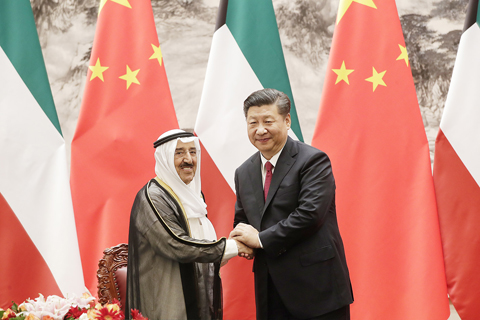Amir, Xi Jinping discuss regional, international issues
 BEIJING: Kuwait’s Amir His Highness Sheikh Sabah Al-Ahmad Al-Sabah (left) shakes hands with Chinese President Xi Jinping after witnessing a signing ceremony at the Great Hall of the People yesterday. — AFP
BEIJING: Kuwait’s Amir His Highness Sheikh Sabah Al-Ahmad Al-Sabah (left) shakes hands with Chinese President Xi Jinping after witnessing a signing ceremony at the Great Hall of the People yesterday. — AFPBEIJING: In the midst of his official three-day state visit to Beijing, His Highness the Amir Sheikh Sabah Al-Ahmad Al-Jaber Al-Sabah held extensive talks with Chinese President Xi Jinping, focusing on bilateral ties. The Kuwaiti and Chinese leaders have spoken highly of the tremendous progress in relations between the Gulf state and the world's most populous nation - seeing eye to eye on a myriad of significant issues including current world events.
Since diplomatic relations began in earnest a little under half a century ago, Kuwait and Beijing started to develop camaraderie that still stands to this very day, with their respective economies being the ultimate beneficiaries. Citing a mutual desire to take ties to new levels, His Highness the Kuwaiti Amir and the Chinese president have pinpointed a number of fields that they have agreed to cooperate on, chiefly, the need to establish a platform for dialogue as a constant form of engagement.
Meanwhile, Beijing has thrown its weight behind His Highness's efforts to quell a Gulf dispute, in addition to other humanitarian initiatives Kuwait has been known to pursue, by virtue of the "Humanitarian Leader" moniker the UN has bestowed upon His Highness the Amir. The two countries have also emphasized their commitment to one another's sovereignty through a non-interventionist and non-meddling policy, with Kuwait seeing the self-ruled island of Taiwan as a breakaway province to be reunited with mainland China.
The two leaders pointed out that peace and stability in their countries is partially contingent upon a free and open Indo-Pacific, as well as ensuring peaceful resolutions to conflicts in the region. Kuwait also said that it is a proponent of the Chinese government's "Belt and Road Initiative", in addition to other similar development strategies that allow Beijing to reach out to the rest of the world.
They agreed that energy production and investment are crucial aspects of scientific development, in addition to being two concrete concepts that can help get development projects in Kuwait off the ground, namely its "Silk City" urban enterprise. They revealed that a joint economic and trade committee has been set up with the purpose of easing bilateral trade and investment, which will prove instrumental in improving economic ties.
With that in mind, China has commended Kuwait's active participation in Beijing's "International Import Expo," with both nations agreeing that cooperation in the financial sector is key to boosting bilateral trade and investment. The two nations also agreed to work closely together in fields running the gamut from culture and education to healthcare and tourism, in addition to the fight against terror, hinting that a plan to introduce visa free travel between Kuwait and Beijing could be in the works. Other plans include establishing a free trade zone between China and the Gulf Arab states, which serves the best interests of both regions, as the two countries appreciated one another's contributions towards keeping peace and security in the region intact. - KUNA










